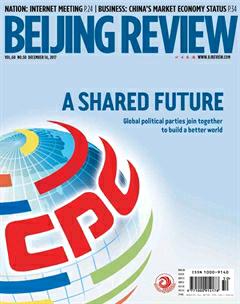Trade Imbalance
By+Wang+Jun
the Office of the U.S. Trade Representative (USTR) submitted in mid-November a statement to the WTO refusing to grant market economy status (MES) to China. The U.S. decision, which was made public on November 30, confi rms that it holds the same position as the EU of opposing China“automatically” obtaining MES. The USTR submitted the statement as a third-party brief in support of the EU. In December 2016, China brought a case against the EU because the latter refused to grant MES to China and continued using the surrogate country approach in its anti-dumping cases against China.
According to Section 15 of Chinas accession protocol, signed upon the nations WTO entry in 2001, the surrogate country approach expired on December 11, 2016, and all WTO members must abandon the approach when calculating anti-dumping measures against Chinese exports thereafter.
At a press conference of Chinas Ministry of Foreign Affairs held on December 1, spokesman Geng Shuang said, “ The concept of the so-called non-market economy cannot be found in multilateral WTO rules, since it was created by several countries during the Cold War.” The surrogate country approach in anti-dumping cases must be abandoned, as scheduled in Chinas accession protocol, and it “has nothing to do with whether or not China meets the so-called MES standards.”
Chinas Ministry of Commerce (MOFCOM) also expressed strong dissatisfaction with the U.S. opposition on December 2, saying that the U.S. is in defiance of WTO rules and misleads the public by confusing the surrogate country approach with MES.
MOFCOM said the case is irrelevant to MES, and WTO rules include no criteria of MES. The U.S. is not a country concerned in that case, and China has brought another case against the U.S. to the WTO.
Bai Ming, a researcher with the Chinese Academy of International Trade and Economic Cooperation, said whether or not the U.S. recognizes Chinas MES, it should no longer be connected with the surrogate country approach because it doesnt exist in WTO rules.“China must also guard against the risks of increasing frictions in international trade brought by this,” Bai told National Business Daily.
Some WTO members once used domestic prices in Singapore and the U.S. as references to evaluate prices of Chinese products. By these standards, they confirmed the dumping of Chinese products and then decided to levy high anti-dumping duties.
“With the surrogate country approach, the standards of dumping would be excessively extended,” said Bai, adding that in anti-dumping investigations against China, some countries tend to choose markets with high costs or other non-typical markets as the “surrogate countries,” thus easily confi rming the existence of dumping.endprint
According to MOFCOM data, last year, 27 countries and regions had brought 119 trade remedy cases against China, of which 91 were anti-dumping cases, and China has become the nation suffering the most anti-dumping investigations for over 20 years in succession.
Right before the U.S. rejected the granting of MES to China, the U.S. Department of Commerce launched investigations on November 28 covering more than $600 million worth of imports of aluminum sheets from China.
Wang Hejun, head of MOFCOMs trade remedy and investigation bureau, said the move marked the first time in 25 years that the U.S. Department of Commerce, rather than any local industrial association, initiated such anti-dumping duty investigations.
“The aluminum industries in the two nations are complementary to each other, and the trade of such products is two-way,” Wang said.“Disturbing normal aluminum trade activities will harm the interests of both sides.”
China will take necessary measures to ensure its aluminum companies legal rights are upheld, Wang said.
Bai thinks the U.S. opposition to granting MES to China will increase trade frictions in the future, and China will hence meet more trade barriers, making its exports more diffi cult.
Huo Jianguo, Vice Chairman of the China Society for World Trade Organization Studies, said the U.S. has always had a mindset of suppressing China, instead of settling disputes by seeking long-term benefits. Although China has fulfilled its obligations in strict accordance with its WTO accession protocol over the past 15 years, the U.S. and the EU are still reluctant to abandon measures of restraining China.
Xin Hua, a visiting research fellow with the Center for National Strategic Studies of Shanghai Jiao Tong University, believes the U.S. opposition to recognizing Chinas MES will not produce serious results because the U.S. and the EU had already made clear their stances of rejecting Chinas MES. China is already fully prepared for such an outcome.endprint

